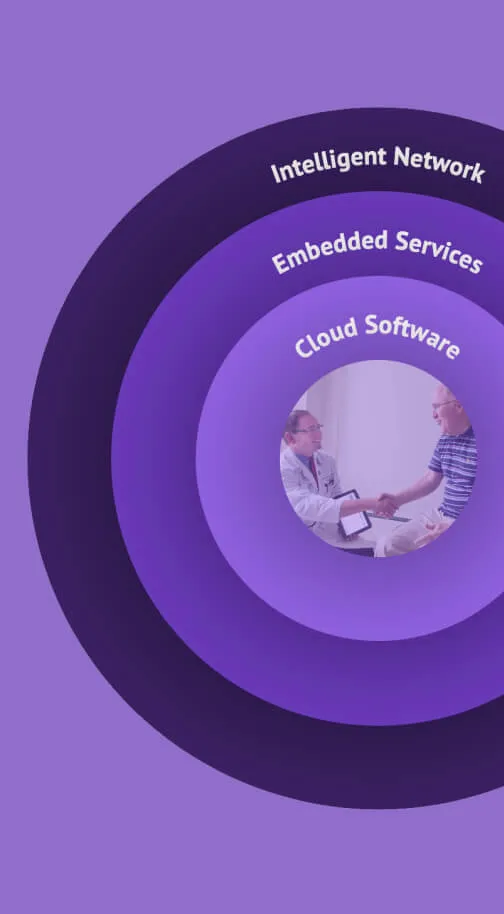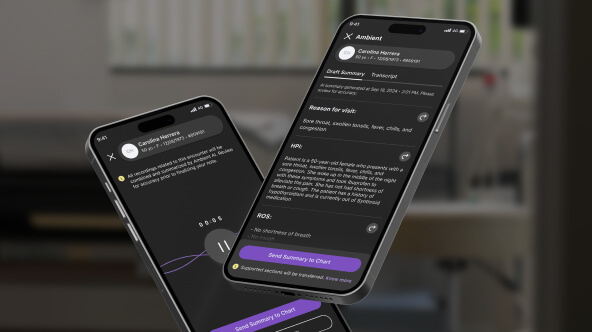In recent years the healthcare industry has seen many changes to the everyday tools and technology used within hospitals, labs, clinics, and doctor’s offices. A digital transformation has begun, with artificial intelligence in healthcare emerging as a powerful tool to drive efficiency and improve patient outcomes. And medical practices and healthcare organizations of all sizes and specialties stand to benefit significantly from leveraging these emerging AI technologies such as ambient listening, generative AI and machine learning.
In the recent Physician Sentiment Survey, a report fielded by athenahealth of 1,000 practicing physicians in the U.S., 39% of physicians said they believe healthcare AI has the power to reduce administrative burdens and streamline tasks.1 By purposefully integrating this new technology, healthcare organizations have potential to streamline processes, optimize resource allocation, reduce burnout, and enhance clinical decision-making, ultimately leading to cost savings and improved quality of care.
To highlight the critical results of this research, we're examining the top use cases for healthcare AI technology that physicians believe could benefit them most. Here are six potential opportunities to consider as your medical practice or healthcare system continues to leverage AI in your day-to-day workflows. Let’s dive in.
1. Clinical decision support and diagnostics
AI-powered decision support systems can assist healthcare professionals in using data to make more accurate diagnoses and treatment recommendations. 42% of physicians surveyed said that a leading potential benefit of AI is identifying patterns and anomalies in patient data. Machine learning algorithms can analyze vast amounts of raw patient data, medical literature, and clinical guidelines to identify patterns and provide evidence-based suggestions.2 This application of AI for medical diagnosis has the potential to not only improve diagnostic accuracy but also assist physicians in catching health issues earlier. Earlier detection can lead to better patient outcomes and potentially lower healthcare costs associated with misdiagnoses or ineffective treatments.
2. Intelligent workflow automation
Enterprise healthcare organizations and smaller, independent medical practices alike often struggle with inefficient workflows and administrative burdens, which can lead to delays, errors, and increased costs. Emerging healthcare AI may help streamline these processes by automating repetitive tasks, such as appointment scheduling, medical coding, and data entry. Robotic process automation (RPA) and natural language processing (NLP) technologies can be employed to handle these tasks more efficiently, freeing up valuable time for healthcare professionals to focus on patient care.
3. Resource optimization
The effective allocation of resources, including staff, equipment, and supplies, is crucial for clinics and healthcare organizations to operate efficiently and provide timely care. In fact, 35% of physicians surveyed listed increased efficiencies as a key benefit of healthcare AI.3 New AI technology has the power to assist in optimizing resource utilization by analyzing historical data, forecasting demand, and identifying potential bottlenecks or underutilized areas. Predictive analytics can help organizations anticipate staffing needs, manage inventory levels, and optimize facility layouts, which may lead to cost savings in the long run.
"By looking to new technology like AI and automation to help reduce administrative burdens and shorten documentation times, physicians can get time back in their day to focus on patient care and attracting new patients."
4. Population health management
Artificial intelligence in healthcare can also play a pivotal role in population health management y analyzing large datasets to identify risk factors, predict disease trends, and develop targeted interventions.4 Some machine learning models are beginning to stratify patient populations based on health risks, enabling healthcare organizations to design personalized care plans and allocate resources more effectively. Additionally, AI-powered remote monitoring and telehealth could facilitate preventive care and chronic disease management, helping reduce the burden on healthcare facilities and improving overall population health.
5. Medical imaging and radiology
AI-powered image analysis and computer vision technologies can start to assist radiologists in interpreting medical images more accurately and efficiently. 34% of physicians surveyed said that a leading potential benefit of AI is improved accuracy of patient diagnoses.5 In this form of AI for medical diagnosis, machine learning algorithms help detect subtle patterns and anomalies in images, providing an additional aid in the early detection of diseases and reducing the risk of missed diagnoses. Additionally, AI can potentially help streamline workflows in radiology departments by automating tasks such as image preprocessing, prioritization, and reporting.
6. Voice-powered documentation solutions
Many healthcare organizations say time spent documenting patient encounters is a huge challenge for their organization. Our research shows that physicians spend over 15 hours per week outside of normal business hours on paperwork and administrative tasks.6 The amount of time spent taking notes can be a huge burden, and it subtracts time that would otherwise be spent connecting directly with patients and fostering relationships.
Voice-to-text dictation—sometimes referred to as AI dictation or AI scribe technology—is quickly becoming a highly used service among healthcare organizations looking to cut down on documentation time. AI-powered ambient listening technology can help reduce documentation time normally spent on clinician notetaking and medical history, boost productivity, and create new efficiencies during patient encounters.
Some intuitive services can actually retrieve clinical information and complete meaningful clinical tasks hands-free, from desktop or mobile devices. By integrating AI scribe voice dictation services into day-to-day workflows, clinicians can achieve increased efficiency during patient encounters, while also focusing more on being present and providing care.
Virtually all medical practices in the US—from enterprise scale healthcare organizations to small independent practices—can integrate this new AI technology to enhance and strengthen existing tools and workflows to help drive efficiencies, improve patient outcomes, and stay competitive in an increasingly digital healthcare landscape. By looking to new technology like AI and automation to help reduce administrative burdens and shorten documentation times, physicians can get time back in their day to focus on patient care and attracting new patients.
Start by evaluating where your business is and what goals are most important. In the future, your organization should look for ways to tackle the low-hanging fruit that yields the most impact: start automating existing processes in your day-to-day, such as notetaking and documentation, using AI-powered tools like voice dictation.
To learn more about how artificial intelligence in healthcare can help you do more with less, read the articles linked below.
1-6. 2023 Physician Sentiment Survey, commissioned by athenahealth and fielded by Harris Poll, Jan 2024












